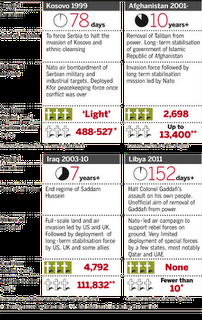The war in Libya ends successfully with a small number of casualties. As shown in the chart below, this war was smaller and quicker than wars in Kosovo, Iraq, and Afghanistan. However, James Blitz, political editor of the Financial Times, points out some lessons to be learnt for policymakers in Europe and America (“Defence: Lessons from Libya”; Financial Times; August 30, 2011).

To begin with, lack of unity within NATO delayed the progress in this war, and Colonel Khadafy is not still found yet, though his regime has completely collapsed now. While Britain and France led NATO operations, other European members including Spain and Turkey refused to participate in ground attacks, and Germany and Poland rejected to join all missions. US Secretary of Defense-then Robert Gates urged more defense commitment by European allies at the Brussels meeting this June. Quite ironically, the United States decided to "lead from behind" in this war, and just supported the coalition led by Britain and France, but did not directly involved in combats. In consequence, NATO forces lacked solid and coherent leadership to defeat Muammar Khadafy. It is widely known that Republican politicians and conservative opinion leaders criticize such self-denial of America by the Obama administration.
The will of intervention is not the only problem. European nations do not have sufficient scales of armaments to defeat a weak and small enemy like Khadafy’s Libya. Due to stagnant economy, European governments are obsessed with the idea of small and efficient armed forces. However, Britain faced critical shortage of airpower because the Royal Air Force was cut drastically under the Strategic Defence and Security Review (SDSR). While NATO fighter planes were attacking Khadafy’s army, Air Chief Marshall Sir Stephen Dalton warned that the Cameron administration’s defense plan was unsustainable to maintain British military capability on the global stage (“RAF chief Sir Stephen Dalton makes case for Britain's air power”; Guardian; 3 April 2011). France barely kept its aircraft carrier Charles De Gaulle operational during the war. Apparently, current size of European military is insufficient.
We have to remember that Blitz stresses importance of ground battle. Air attack does not guarantee the victory in the end. One senior British official of the Ministry of Defence even said, “The countries that deserve most credit in this conflict are Qatar and the United Arab Emirates. They provided the rebels with the training and weapons they needed, and acted as their leaders.”
The war in Libya gives lessons for policymakers on both sides of the Atlantic. As James Blitz mentions, reluctant attitudes among some NATO members ruins the unity of the alliance. The foremost problem is the size and the quality of armed forces. Currently, both America and Europe are preoccupied with the budget. Remember. Former Secretary of Defense Robert Gates said “I have long believed, and I still do, that the defense budget, however large it may be, is not the cause of this country's fiscal woes” and "a smaller military, no matter how superb, will be able to go to fewer places and be able to do fewer things.” In a globalized world, more overseas intervention is required to keep free nations safe. American and European leaders and citizens must learn a lot of vital lessons from Libya.
Debate Magazine
The Implication of Libya to the Trans-Atlantic Alliance
Posted on the 03 September 2011 by ShahalexanderAuthor's Latest Articles
-
Harris Loss and Leadership for National Unity
-
Should the LDP Leader Election Sacrifice Japan’s UN Diplomacy?
-
How Well Did Foreign Secretary Cameron Act the Role of Churchill to Move America for Defending Ukraine?
-
A Question About Former US Ambassador to Japan Hagerty’s Interview

